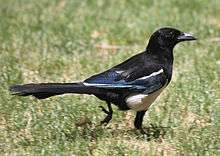Definify.com
Webster 1913 Edition
Pica
Pi′ca
,Webster 1828 Edition
Pica
PI'CA
,Definition 2026
Pica
Pica
Translingual
Proper noun
Pica f
Hyponyms
- (genus): Aves - class; Carinatae - subclass; Neornithes - infraclass; Neognathae - parvclass; Passeriformes - order; Passeri - suborder; Corvida - parvorder; Corvoidea - superfamily; Corvidae - family
Hyponyms
- (genus): Pica hudsonia (black-billed magpie), Pica nuttalli (yellow-billed magpie), Pica pica (European magpie) (species)
References
- Gill, F. and Wright, M. (2006) Birds of the World: Recommended English Names, Princeton University Press, ISBN 978-0691128276
pica
pica
English
Noun
pica (usually uncountable, plural picas)
- (medicine) A disorder characterized by craving and appetite for non-edible substances, such as ice, clay, chalk, dirt, or sand.
- 1986, George S Baroff, Mental retardation: nature, cause, and management:
- The three most common nonfood picas were eating of strings and rags; feces, vomit, and urine; and paper, cigarettes, and soil.
-
Synonyms
Translations
Etymology 2
From Medieval Latin pica (“pica: a service book”), possibly from Latin pīca (“magpie”) after the piebald appearance of the typeset page (cf. pie, "disordered type"). The relation to the printer's measure is unclear, as no edition of the text in pica type is known. The French pica derives from English rather than vice versa.[1]
Noun
pica (countable and uncountable, plural picas)
- (typography, printing, uncountable) A size of type between small pica and English, standardized as 12-point.
- (typography, uncountable, usually with qualifier) A font of this size.
- (typography, countable) A unit of length equivalent to 12 points, officially 35⁄83 cm (0.166 in) after 1886 but now (computing) 1⁄6 in.
- (uncommon, ecclesiastical) A pie or directory: the book directing Roman Catholic observance of saints' days and other feasts under various calendars.
Derived terms
|
Translations
See also
Etymology 3
Noun
pica (plural picas)
- Archaic form of pika. (small rodent)
- 1895, Richard Lydekker, The Royal Natural History (volume 3, page 190)
- Most travellers in the Himalaya are familiar with the pretty little Rodents, known as picas, tailless hares, or mouse-hares, which may be seen in the higher regions […]
- 1895, Richard Lydekker, The Royal Natural History (volume 3, page 190)
Anagrams
References
- 1 2 3 Oxford English Dictionary, 3rd ed. "pica, n.1" & "pica, n.2". Oxford University Press (Oxford), 2006.
Catalan
Pronunciation
- (standard) IPA(key): /ˈpikə/
- (Valencian) IPA(key): /ˈpika/
Noun
pica f (plural piques)
Galician
Noun
pica m (plural picas)
- pipit
- (card games) spade (a playing card of the suit spades, picas)
Verb
pica
Latin
Alternative forms
Etymology
From Proto-Indo-European *(s)peyk- (“woodpecker; magpie”).
Pronunciation
- (Classical) IPA(key): /ˈpiː.ka/
Noun
pīca f (genitive pīcae); first declension
Inflection
First declension.
| Case | Singular | Plural |
|---|---|---|
| nominative | pīca | pīcae |
| genitive | pīcae | pīcārum |
| dative | pīcae | pīcīs |
| accusative | pīcam | pīcās |
| ablative | pīcā | pīcīs |
| vocative | pīca | pīcae |
Descendants
References
- pica in Charlton T. Lewis and Charles Short (1879) A Latin Dictionary, Oxford: Clarendon Press
- pica in Charlton T. Lewis (1891) An Elementary Latin Dictionary, New York: Harper & Brothers
- PICA in Charles du Fresne du Cange’s Glossarium Mediæ et Infimæ Latinitatis (augmented edition, 1883–1887)
Portuguese
Noun
pica f (plural picas)
Verb
pica
- third-person singular (ele and ela, also used with você and others) present indicative of picar
- second-person singular (tu, sometimes used with você) affirmative imperative of picar
Romanian
Etymology
From pic. Compare also Aromanian chicu, chicare.
Verb
a pica (third-person singular present pică, past participle picat) 1st conj.
- (of a liquid) to drip
- (literally and figuratively) to fall
- to fail
- to come unexpectedly
Conjugation
| infinitive | a pica | ||||||
|---|---|---|---|---|---|---|---|
| gerund | picând | ||||||
| past participle | picat | ||||||
| number | singular | plural | |||||
| person | 1st person | 2nd person | 3rd person | 1st person | 2nd person | 3rd person | |
| indicative | eu | tu | el/ea | noi | voi | ei/ele | |
| present | pic | pici | pică | picăm | picați | pică | |
| imperfect | picam | picai | pica | picam | picați | picau | |
| simple perfect | picai | picași | pică | picarăm | picarăți | picară | |
| pluperfect | picasem | picaseși | picase | picaserăm | picaserăți | picaseră | |
| subjunctive | eu | tu | el/ea | noi | voi | ei/ele | |
| present | să pic | să pici | să pice | să picăm | să picați | să pice | |
| imperative | — | tu | — | — | voi | — | |
| affirmative | pică | picați | |||||
| negative | nu pica | nu picați | |||||
Synonyms
Derived terms
Serbo-Croatian
Etymology 1
Hypocoristic form derived from pízda (“****”).
Pronunciation
- IPA(key): /pǐːtsa/
- Hyphenation: pi‧ca
Noun
píca f (Cyrillic spelling пи́ца)
Declension
Etymology 2
Pronunciation
- IPA(key): /pîtsa/
- Hyphenation: pi‧ca
Noun
pȉca f (Cyrillic spelling пи̏ца)
Declension
Slovene
Etymology
Pronunciation
- IPA(key): /ˈpìːtsa/, /ˈpíːtsa/
- Tonal orthography: píca, pȋca
Noun
píca f (genitive píce, nominative plural píce)
